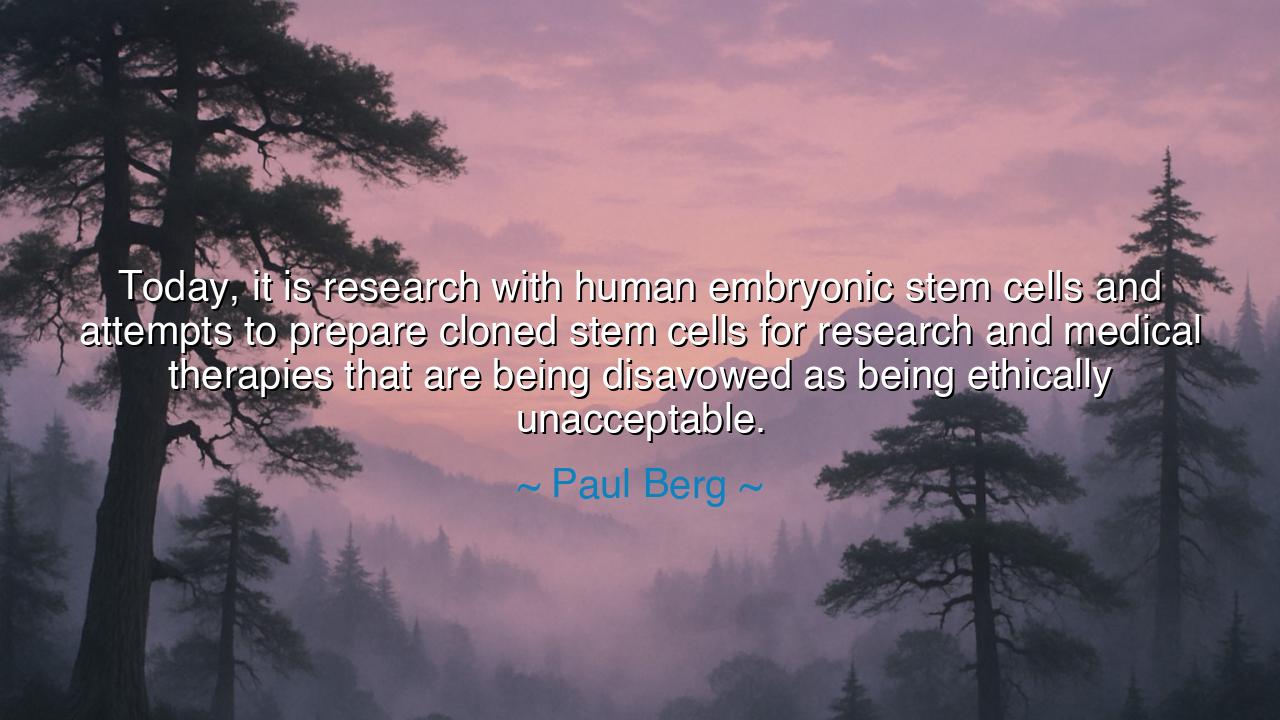
Today, it is research with human embryonic stem cells and
Today, it is research with human embryonic stem cells and attempts to prepare cloned stem cells for research and medical therapies that are being disavowed as being ethically unacceptable.






In the solemn words of Paul Berg, “Today, it is research with human embryonic stem cells and attempts to prepare cloned stem cells for research and medical therapies that are being disavowed as being ethically unacceptable.” we hear the clash of progress and morality. Berg, a pioneer in the field of molecular biology, touches upon a fundamental struggle that has echoed throughout human history: the tension between scientific advancement and the moral compass of society. In his statement, Berg is not simply speaking of the ethics of stem cell research; he is speaking of the very nature of human inquiry—how we choose to push the boundaries of knowledge and whether, in doing so, we lose sight of the sacredness of life. This tension between discovery and ethics is as old as human ambition, and it reflects the timeless question: How far can we go without losing our way?
The origin of this quote is rooted in the modern scientific landscape, where technologies such as human embryonic stem cells and cloning have sparked intense debate. While these innovations hold the promise of life-saving therapies—from regenerating tissues to curing diseases—Berg points out that the ethical implications are profound and often contentious. The very essence of these technologies—the manipulation of human life at its earliest stages—raises questions about the sanctity of life, autonomy, and what it means to play god. Just as the ancients feared the reckless ambitions of those who sought to manipulate nature, so too do modern societies find themselves standing at a precipice, unsure of the consequences that lie ahead.
The question of whether we should engage in such scientific advancements is not new. Prometheus, in the Greek myth, stole fire from the gods to give to humanity, empowering us with the ability to create, to shape our destiny. However, his gift came at a great cost, as he was forever chained, punished for his hubris. The myth speaks to a deeper, universal truth: with the gift of knowledge and power comes the responsibility to wield it wisely. Icarus, too, soared too high, his wings melted by the sun as a consequence of human overreach. These ancient stories serve as cautionary tales, warning us that scientific progress, when divorced from ethical consideration, can lead to disaster rather than salvation.
In more recent history, consider the Manhattan Project, where brilliant minds worked to create the atomic bomb—a tool that could bring an end to war but also decimate entire civilizations. The scientists who built the bomb were torn between their sense of duty to their country and the moral dilemma of creating such a powerful weapon. In the end, their invention led to the horrors of Hiroshima and Nagasaki, proving that knowledge, without ethical restraint, can have devastating consequences. The legacy of the atomic bomb reminds us that science, while an instrument of progress, must always be tempered with humility, wisdom, and a deep understanding of the human cost of its discoveries.
Berg’s quote calls us to reflect on where the line should be drawn in the pursuit of scientific knowledge. What does it mean to “play god” in the laboratory? Is it our right to manipulate the very building blocks of life, or is it a sacred responsibility to honor the mystery and sanctity of existence? These questions are at the heart of the ethical debate surrounding stem cell research and cloning. While such advancements may offer miraculous medical breakthroughs, we must not forget that with the power to create life comes the power to destroy it. The ability to manipulate the genetic makeup of organisms and even create life in the lab challenges the boundaries of what it means to be human, forcing us to confront questions of morality, purpose, and identity.
The lesson here is clear: progress must always be guided by wisdom. While science and technology hold the potential to heal and transform, they must never be pursued without careful consideration of their ethical ramifications. Like the great philosophers and scientists of the past, we must ask ourselves: what is the greater good? Will our advancements lead to a future of flourishing and humanity, or will they open doors to destruction and dehumanization? The challenge of our age is to balance innovation with morality, to ensure that our thirst for knowledge does not blind us to the moral obligations that come with it.
In our own lives, we must take this lesson to heart: knowledge is a gift, but it is a gift that must be handled with care. We live in an age where technology and science have the potential to change the very fabric of our existence, but we must always ask ourselves: what are we sacrificing in the process? As we move forward into the future, we must remember that the pursuit of wisdom is as important as the pursuit of knowledge. We must always keep in mind the sacredness of life and the ethical consequences of our actions. In this way, we can ensure that our discoveries will serve not just the advancement of science, but the betterment of humanity as a whole.






AAdministratorAdministrator
Welcome, honored guests. Please leave a comment, we will respond soon